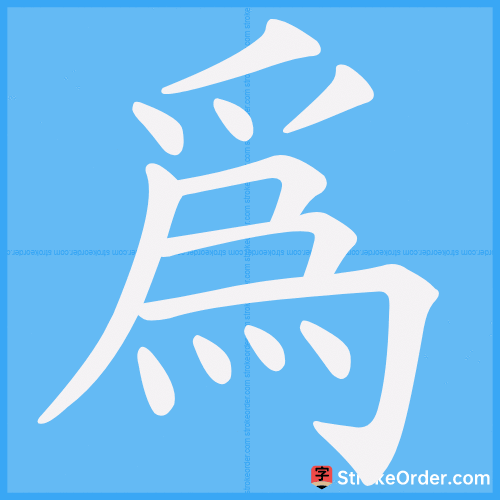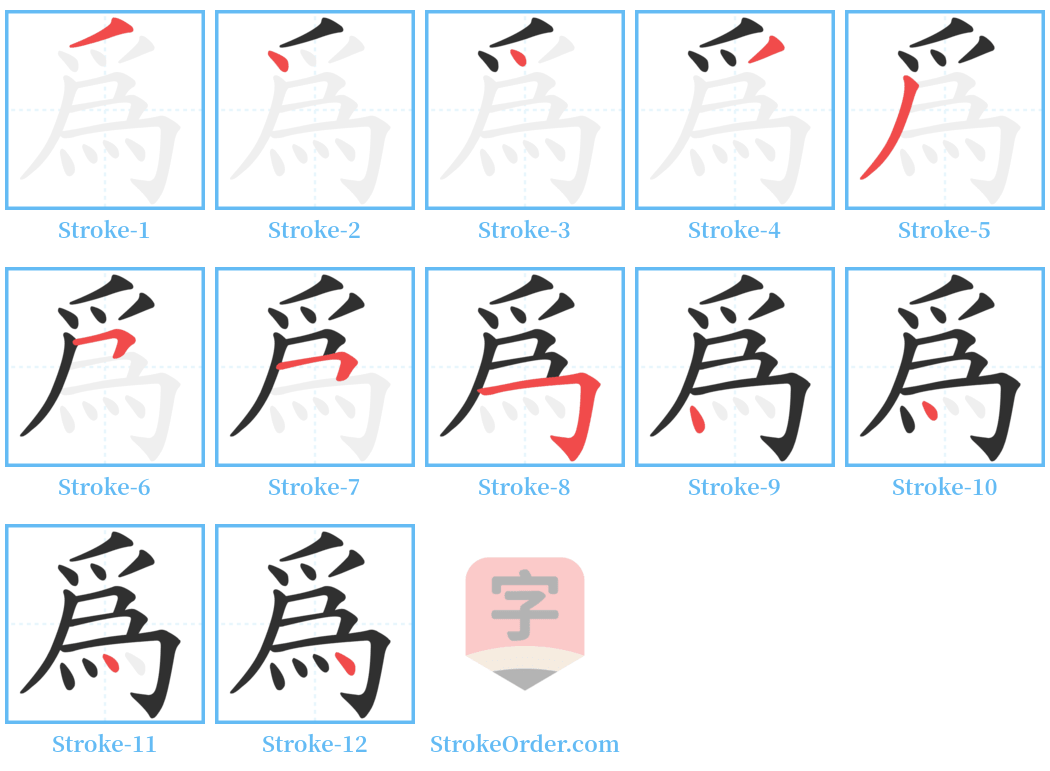為 Stroke Order
Animated Stroke Order of 為

Stroke Order Diagrams for 為

Step-by-Step Handwriting Guide for 為

Learn to Write Chinese Characters with Video Tutorials
Watch the video of writing the Chinese character "為", learn the correct stroke order (笔顺) of the character "為", and master the standard way of writing the character "為".
Free Printable Handwriting Practice with Stroke Order: 為
Printable Writing Practice Worksheet of "為" in Portrait Orientation (Tian Zi Ge)

Printable Writing Practice Worksheet of "為" in Landscape Orientation (Tian Zi Ge)

Information of 為
Pinyin
wéi、 wèi
Radical
灬
Strokes
9 strokes
Usage
★★★
Definition
because of / for / to / as (in the capacity of) / to take sth as / to act as / to serve as / to behave as / to become / to be / to do / by (in the passive voice)
為 (为)
wéi
部首:爪
词性:动词
1. Preposition: Equivalent to "因" (because), indicating reason. 【Example】: 为什么你不赞成明天开会? (Why do you not agree to hold a meeting tomorrow?)
2. Preposition: Equivalent to "替" (for), indicating the object of concern. 【Example】: 为民服务 (Serve the people), 为国增光 (Enhance the nation's glory).
3. Preposition: Equivalent to "对" (to), indicating the object of an action. 【Example】: 这点小事不足为外人道。(This small matter is not worth mentioning to outsiders.)
4. Preposition: Equivalent to "为了" (for the sake of), indicating the purpose of an action. 【Example】: 这次义演是为劝募救灾基金而举办的。(This charity performance is held to raise disaster relief funds.)
部首:爪
字义:
1. (Ideogram) Word of meaning for "to act," originally meaning "to do things, to act."
2. Borrowed meaning for "to make." To do, act, to make (English translation: do; act; make).
3. To create; to compose (English translation: make; compose).
4. To administer (English translation: administer).
5. To become (English translation: become).
6. To be (English translation: be).
7. To study (English translation: study).
8. To plant; to cultivate (English translation: plant).
9. To establish; to set up (English translation: establish).
10. To let (English translation: let).
11. To think; to believe; to consider (English translation: think; believe; consider).
12. To play (English translation: play).
部首:介
词性:名词
- Surname
部首:介
字义:
1. To be (English translation: by) - introduces the agent of an action.
2. In (English translation: in) - indicates time or place.
3. And (English translation: and) - indicates a coordinating relationship.
4. Then (English translation: then) - indicates a consequential relationship.
5. If (English translation: if) - indicates a hypothetical relationship.
6. Or (English translation: or) - indicates a choice relationship.
部首:介
助词:
1. Of (English translation: of) - used in noun phrases.
2. A marker for the preposition before the object.
3. Attached after monosyllabic adjectives to indicate a degree or range of increase or expansion.
4. Attached after degree adverbs to strengthen the meaning.
5. Used at the end of a sentence to indicate rhetorical questions or doubts, often combined with "何" (what).
6. Used at the end of a sentence to express exclamations.
部首:介
其他词义:
1. (Ideogram) The original meaning refers to female monkeys.
2. To help (English translation: help).
3. To speak; to tell (English translation: tell; speak).
4. Because; for; on account of (English translation: because; for; on account of).
5. For; for the benefit of (English translation: for; for the benefit of).
6. Toward; facing to (English translation: facing to; toward).
Please refer to additional meanings from dictated literary examples for comprehensive interpretation.